Hefner built an empire on the basis of an alternative version of reality, creating what you might call a religion.
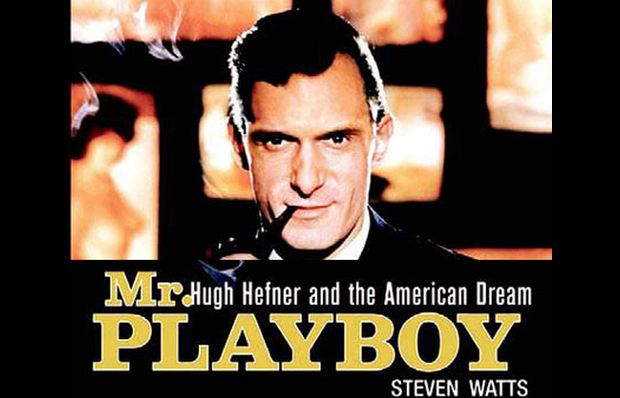 Hefner embodied the American Dream.
Hefner embodied the American Dream.
At the age of 89, Hugh Hefner has announced that the magazine Playboy will no longer feature nude women. When in 1960, the author of “2001: A Space Odyssey”, Arthur C. Clarke, announced that technology had changed and would radically change our lives, he could hardly have imagined that one day a simple click of a mouse would show us things that were much more risqué than a scantily clad female body.
I was in Chicago one rainy night, having been invited to preach at the Central Baptist Church. I was being driven there by the producer of Radio Moody, Gerson García Giró. As we passed by an old mansion, my old friend from Malaga, who knew of my incurable curiosity, asked me “Do you know who lived here?”. The building was up for sale and, in the darkness, had a somewhat sinister and abandoned look to it.
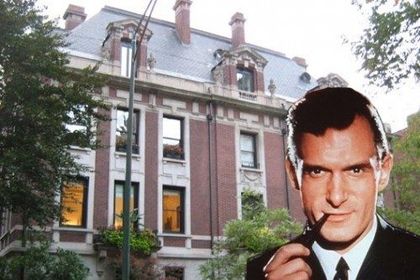 The Playboy Mansion when Hefner lived in Chicago in the 70s.
The Playboy Mansion when Hefner lived in Chicago in the 70s.Gerson described its former resident as an old man who would always appear wearing a dressing gown, silk pyjamas and smoking a pipe. Those of us who were born in the sixties and suffer the ignominy of possessing a general knowledge not always acquired by sitting on a church bench, know that this man is none other than Hugh Hefner, always seen next to his seductive “bunnies”. It was the Playboy Mansion…
THE PLAYBOY PHILOSOPHY
The Playboy empire was born in Chicago in 1953, long before its artificial paradises in sunny California. Its target audience was referred to at that time as the “urban man” – urban being a term that has since become a reference to Afro-Americans –. From December 1962 to May 1965, Hefner published a series of articles entitled “The Playboy Philosophy”. The essays received a lot of attention, read by both his admirers and detractors, as a statement of his worldview.
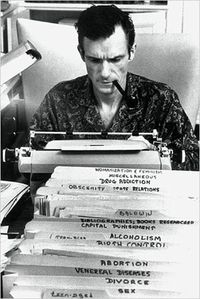 Hefner creates a wholoe worldview around Playboy.
Hefner creates a wholoe worldview around Playboy. The magazine used those articles to answer those who had accused him of degrading the country’s morality, ruining the virtue of American women and promoting a “cult of irresponsibility”. Hefner’s thinking in those texts clearly reflects his rebellion against his parents’ Methodist upbringing. He was born in a Christian family in Chicago in 1926, growing up practically without a father. There is no doubt that his mother was a devout Christian, although he has accused her in his biographies of never holding him in her arms.
Hugh was the elder of two brothers. He was drafted into the army at the end of the Second World War, after which he went to university to study art and psychology. He married a fellow student but when she confessed to having had an affair with another man while he was away in the army, he says that it was “the most devastating moment in my life”. He then started to have all kinds of affairs until the marriage broke apart in 1959.
SEXUAL REVOLUTION
The founder of Playboy, worked for the Esquire magazine, before publishing his first issue in Christmas 1953. It contained the famous naked photographs of Marilyn Monroe, which had been used in a calendar for 1949. Hefner never knew her, although he bought the crypt next to hers. First he thought of calling the magazine “Stag Party”, but for rights reasons, he chose the name of an out-of-business Chicago car company called Playboy.
At the end of the 1950s – as we see in the television series Mad Men–, the United States tried to distance itself from the war and the Depression era, but also from the customs of a conservative society, which Hefner considered to be sexually repressive and puritanical. He was a champion for freedom of expression, the separation of church and state, but above all for the merits of free enterprise, individualism and the need for a modern hero, in the guise of the “uncommon man”. What is surprising, however, is the number of references he makes to religion.
The series of essays begin by quoting the criticisms levelled at him by a Jewish professor, a Methodist pastor and a Unitarian minister, finishing up with a four-page transcription of a “religious round table” on the Playboy philosophy and the emerging American sexual revolution, broadcast by a radio in Chicago. In it, we hear a catholic priest “well known for his interest in…jazz”, an episcopal pastor, a rabbi and Heffner. The conversation is said to have been organized in cooperation with the Archdiocese of New York, the American Jewish Committee and the Protestant Council of the City of New York, and Hef, “president of… the whole Playboy empire”.
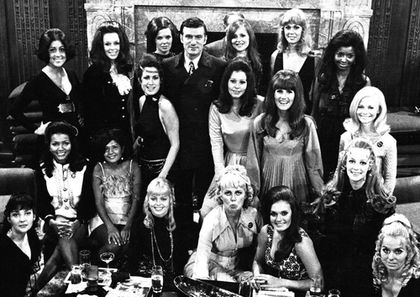 Hefner tries to lead the sexual revolution, from Chicago.
Hefner tries to lead the sexual revolution, from Chicago.
THE END OF THE PARTY
Hefner thus placed himself at the forefront of a sexual revolution, run from the mansion that he bought in Chicago in 1959. There he is reported to have held parties with famous singers such as Frank Sinatra and Dean Martin, or baseball players like Joe DiMaggio, surrounded by naked women in an indoor swimming pool. A bar under the pool, accessed down a fireman’s pole, looked up into the greenish fish-tank light where female bodies swam about like mermaids. This world of sexual fantasy would then be recreated in the heated pool in the grotto that he built in his California mansion in the seventies.
Forty years ago, this four-storey Victorian-style house was already at the epicentre of an “empire” that included, in addition to the magazine, clubs, cinemas, hotels, casinos and a television programme. Hefner left the city in 1975 to set himself up in Beverly Hills – from where he directed the company until 2009, when he was succeeded by his daughter Christie–. The Playboy bunny and bow tie logo became a symbol in American culture right from the second edition of the magazine in 1954.
In 1963, Hefner was arrested for selling obscene material, having published photographs of the actress Jane Maynsfield – who died shortly afterwards in a car accident –. When he was acquitted, he established a foundation to combat censure and investigate human sexuality. In the 1970s, Playboy started to have problems due to competition from other more openly pornographic magazines and the death of Hefner’s secretary, found to have taken an overdose in a Chicago hotel. Hefner said that she had committed suicide due to harassment from narcotics and federal agents.
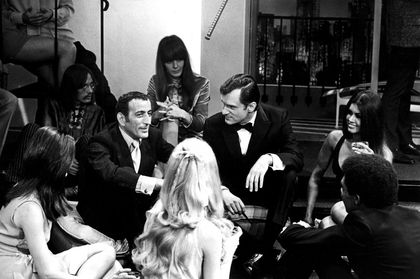 Singer Tony Bennet in one of the Playboy parties in the 60s.
Singer Tony Bennet in one of the Playboy parties in the 60s.RELIGIOUS MAGAZINE
The director of Playboy remarried at the end of the eighties, after having been rushed to hospital following a stroke. That spelt the end of the continuous partying in his mansion. He tried to lead a family life with his two sons, but his philosophy of eternal adolescence had by then become established in our culture. No one under the age of fifty will be surprised by this. He presents us with an alternative version of reality, creating a kind of religion. As he says at the beginning of the series of his essays: “Playboy is a religious magazine, though I will admit I have a peculiar understanding of the meaning of the word”.
It is religious because it “tells its readers how to get into heaven. It tells them what is important in life, delineates an ethics for them, tells them how to relate to others, tells them what to lavish their attention and energy upon, gives them a model of a kind of person to be. It expresses a consistent world view, a system of values, philosophical outlook”. That image of an “ideal man” creates a universe of its own for the eternal adolescent, without making demands or imposing responsibilities. It is a masculine fantasy, where women become mere objects, because when we distance ourselves from God, man does not become more but less human – as seen in the story of Nebuchadnezzar in the fourth chapter of the book of Daniel in the Bible–.
“Religion was a very important part of my upbringing – Hefner has said – in terms of ideals and morality”. He does not think that he has rejected it, only that when it comes to sex, he thinks that it is hypocritical and harmful. The director of Playboy considers himself to be a spiritual person, but he does not believe in the supernatural. “I believe in the creation,” he says.” And therefore I believe there has to be a creator of some kind, and that is my God. I do not believe in the biblical God, not in the sense that he doesn’t exist, just in the sense that I know rationally that man created the Bible and that we invented our perception of what we do not know”.
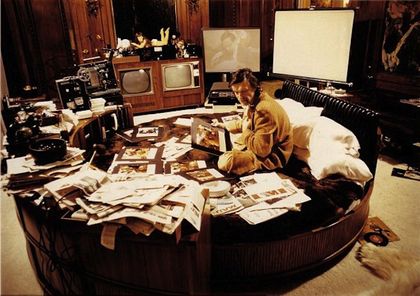 The bed Hefner used as an office in his Chicago mansion.
The bed Hefner used as an office in his Chicago mansion.
THE LOVE THAT SETS US FREE
In the first chapter of the book of Romans, the apostle Paul shows us what has happened. By leaving God, we have turned to idols. We have replaced the Creator with his creation. This has tragic consequences. It sets in motion a vicious circle which makes us spurn the only unconditional love that exists, given that God is the only one who loves us without expecting anything in return or expecting us to appear to be anything other than what we are.
His sacrificial love (Ephesians 5:23-32) surprises us, because we do not understand how low we have fallen or the wonder of his love. As C.S. Lewis says in his book “The four loves”, we have locked our hearts up in the casket of our selfishness, to avoid being hurt, when we need to be vulnerable in order to experience love, given that “the only place outside Heaven where you can be perfectly safe from all the dangers and perturbations of love is Hell”.
“We shall draw nearer to God, not by trying to avoid the sufferings inherent in all loves, but by accepting them and offering them to Him; throwing away all defensive armour.” That is when we can get to know God. We can have a personal trusting relationship with Him, based on his faithfulness, which leads us to experience a deep, spiritual and eternal communion. The Playboy culture sees our body and material reality, as the only thing that exists. Life passes – like Hefner’s years – but God’s love remains.
“Now this is eternal life: that they know you, the only true God, and Jesus Christ, whom you have sent”, Jesus says in the Gospel of John (17:3). The director of Playboy says sarcastically that he was saved a long time ago, but true salvation is to know God and to receive eternal life from him, whose glory exceeds our present reality. He elevates and transforms us, giving us hope. Because Christ is the hope of glory (Colossians 1:27), the best is yet to come.

Las opiniones vertidas por nuestros colaboradores se realizan a nivel personal, pudiendo coincidir o no con la postura de la dirección de Protestante Digital.
Si quieres comentar o